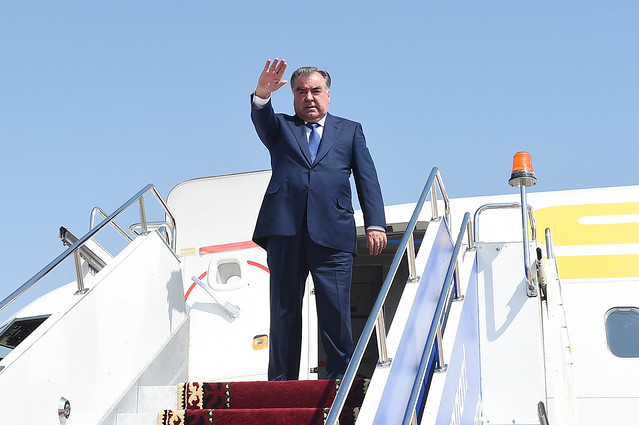Tajik President Emomali Rahmon began a state visit to China on May 16. Tajik leader will also participate in the first Central Asia-China summit that will take place in the Chinese city of Xi’an from May 18-19.
The Tajik president’s official website says the Minister of Foreign Affairs, the Minister of Industry and New Technologies, the Presidential Aide for International Relations, the President Aide for Economic Matters, the Chief of the State Committee for National Security, the Head of the Committee for TV and Radio-Broadcasting, Head of the Committee for Food Security, the President of the National Academy of Sciences and some other officials are accompanying President Emomali Rahmon on his visit to China.
China’s state-run news agency Xinhua reported in May 8 that in addition to participating in the summit, the leaders of Kazakhstan, Uzbekistan, Kyrgyzstan and Tajikistan would conduct state visits in the days before and after the joint gathering. Each Central Asian presidents will hold individual discussions with Chinese leader Xi Jinping.
Turkmenistan’s president, Serdar Berdimuhamedov, reportedly already paid a state visit to China in January, and thus will not get a one-on-one with Xi later this month.
Recall, the Central Asian five leaders were last seen together at May 9 Victory Day events in Moscow.
It is to be noted that trade and economic cooperation between Beijing and the five Central Asia’s nations is reviving after the shutdowns caused by the coronavirus pandemic.
Some media outlets note that China will use the summit to try to build on the major progress it has made recently by establishing visa-free travel deals with several countries of the region.
A new bilateral deal reportedly came into effect this month between Kazakhstan and China that allows passport holders of the countries to stay in the other country for 30 days. The move comes after Uzbekistan approved two weeks of visa-free travel for Chinese tourists and with Kyrgyzstan currently in talks for its own visa-free regime with Beijing that it hopes will boost its economy through increased cross-border trade, investment, and tourism.
The current push in Central Asia reportedly comes as China looks to breathe new life into its multibillion dollar Belt and Road Initiative (BRI) foreign-policy project.
Experts note that China views Central Asia as integral to its long-term economic strategy for Eurasia.
Tajikistan and China have friendly relations characterized by bilateral and multilateral collaboration. The two countries established formal relations on January 4, 1992, shortly after the dissolution of the Soviet Union.
China is now among the three major trading partners of Tajikistan.
Tajikistan and China are active members of the regional and international organizations and closely cooperate within the framework of these organizations, particularly the Shanghai Cooperation Organization. Through the Shanghai Cooperation Organization (SCO), China swayed Tajikistan to combat the ‘three evils’ that are terrorism, separatism, and religious extremism.
The legal foundation of the bilateral cooperation between the two countries includes more than 200 interstate and intergovernmental agreements.
The governments of China and Tajikistan collaborate on security and military training; this collaboration has become stronger since the 2001 United States invasion of Afghanistan. The two countries’ militaries have conducted joint military exercises since 2006.




